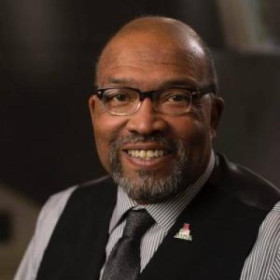
By Sidney Belleroche
sibelleroche@ursinus.edu
On February 15th and 16th, Rev. Dr. Harold Dean Trulear, an associate professor of Applied Theology at Howard University of Divinity, visited Ursinus College to discuss mass incarceration’s relationship with religion. Trulear, this year’s Davis Visiting Professor in Judeo-Christian Values, hosted three events: Creating a Congregational Culture of Restorative Justice in an Age of Mass Incarceration, Seeing People not Labels and Shame, and the culminating Theology Of The Human public lecture.
Dr. Trulear is a prolific writer, publishing over one hundred written works centering on theology. More recently, he has worked with Ursinus, specifically Dr. Patricia Lott, an Associate Professor of American Studies, African American and Africana Studies, and English, college librarian Diane Skorina, along wtih Dr. Aidsand Wright-Riggins, the current mayor of Collegeville, on their project exploring the penal system near Collegeville.
The recurring theme of Trulear’s visit was seeing the humanity in prisoners. “People in the criminal justice system have families,” Trulear stated, “and even the most brazen criminals have souls. We have to help the prisoners in trouble. Our congregation must be safe, relational, restorative, prophetic.”
Trulear’s poignant message comes from personal experience: he, too, was incarcerated. Through his incarceration, Trulear experienced the very topics of grief, loss, and forgiveness, among others he raises awareness about today. “In committing myself to Jesus,” Trulear writes, “I receive his Holy Spirit to shed the labels from my mistakes, live a better life, and serve those oppressed by sin, power, and oppression.”
While cognizant and remorseful of his past actions, Dr. Trulear preaches that addressing the problem of mass incarceration is a community effort. “We feel that some need to be unclean for us to be clean. This dehumanizing stigma spreads across the political spectrum.” Dr. Trulear will continue working with the aforementioned Ursinus staff with research and consultation.
Dr. Trulear left Ursinus following the reception dinner of his “Theology of The Human” lecture, but he was gracious enough to answer further questions on his views, religion, and Ursinus’s efforts pertaining to mass incarceration.
Sidney Belleroche: Do you regret your experience in prison? Or are you at peace with your past and what you do today?
Dr. Harold Dean Trulear: It is not so much that I regret my time in prison, but I regret more the behavior that put me there. However, I have the tools and support to put that behind me. God changes people, but God uses people to support the changes God makes in people. And God can use my past mistakes, pain, and lessons for God’s glory and further change in me, others, and systems.
SB: What further steps can Ursinus College take to ensure your lecture and sentiments are not a one-off incident (in other words, how can Ursinus continue the conversation)?
HT: Ursinus has a grant managed by Dr. Patricia Lott and others to enhance the conversation. But that cannot be the sole context for further work. Walking around your campus, I notice concerns and efforts for diversity and inclusion. Ursinus must be diligent not to exclude potential students and faculty because of past records. Also, with efforts at inclusion for the LGBTQ+ community ought to come awareness of how our criminal justice system treats such people.
SB: What role does politics play in portraying the prison industrial system? Do you believe religion has a significant impact on said portrayal
HT: It is in the best interests of those in power to continue the myth of depersonalizing people in the criminal justice system. Mass incarceration itself has its genesis in the 1968 presidential campaign of Richard Nixon, whose aides suggested that he needed a campaign strategy that would target the Black community (newly progressing under Civil Rights legislation) without appearing to be racist. Hence, the slogan “law and order” and the “war on drugs.” Note that the latter was presented as a Black problem until the current opioid crisis. Now, we have a “public health” issue. Bad religion can oppress, and good religion can liberate. As a Christian, I take my cues from Jesus Christ, who was a member of an oppressed minority, announced his call to ministry by referencing his call to serve the poor, oppressed, and incarcerated, and who gave his life when executed by political and religious elites.
